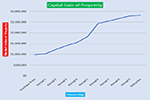|
Capital Gains Tax
|
Residential Home
|
Vacant Land
|
Divorce Home
|
|
If you sell a capital asset, such as real estate, you usually make a capital gain or a capital loss. This is the difference between what it cost you to acquire the asset and what you receive when you dispose of it. You need to report capital gains and losses in your income tax return and pay tax on your capital gains. Although it's referred to as capital gains tax (CGT), this is actually part of your income tax. |
Your ‘main residence’ (your home) is generally exempt from capital gains tax (CGT). To get the exemption, the property must have a dwelling on it and you must have lived in it. Generally, a dwelling is considered to be your main residence if, you and your family live in it, your personal belongings are in it, it's the address your mail is delivered to, it's your address on the electoral roll, services such as gas and power are connected. It becomes complicated when you move in and out of your home. |
You're not entitled to the exemption for a vacant block. Subdividing land is not a CGT event if you retain ownership of the subdivided blocks, so you don't make a capital gain or loss at the time of the subdivision. However, you may make a capital gain or loss when you sell the subdivided blocks. The amalgamation of the titles to various blocks of land that you own does not result in a CGT event happening. |
If you transfer an investment property to your spouse because of the breakdown of your marriage or relationship, there is rollover of the asset. 'Rollover' means the person who give the asset does not pay capital gain or loss that would otherwise arise. The person who receives the asset will make the capital gain or loss when they subsequently dispose of the asset. The cost base of the asset is transferred to the person who receive. |




